Rubber In Shear Apparatus

Order Code: 32203
Category: Strength of Materials Lab
Features Rubber blocks in shear force are often used on engine and in equipment mounting to isolate vibrations. They do this by absorbing shock energy by deforming. This deformation leads to a decrease in cross-section as the block lengt...
SPECIFICATION
Features
Rubber blocks in shear force are often used on engine and in equipment mounting to isolate vibrations. They do this by absorbing shock energy by deforming. This deformation leads to a decrease in cross-section as the block lengthens, an effect described by Poisson's Ratio. After this experiment, students will understand the behavior of a very flexible material such as rubber. Rubber is interesting in that the lay person regards it as an 'elastic' material. In engineering terms it is not as 'elastic' as steel and often exhibits a high degree of hysteresis.
In the Tesca Rubber in Shear Apparatus a rubber block 150 x 75 x 25mm is bonded to two vertical plates. The back plate secures the rubber block to a vertical surface such as a wall. The front plate allows a load hanger to be suspended and also the anvil of a dial gauge to rest. The load hanger is loaded using the calibrated weights supplied and the corresponding vertical deflection of the rubber block is monitored using the dial gauge supplied.
A comprehensive instruction manual is supplied. No wall fixings are supplied
Specifications
Measures the shear deflection of a rubber block 150x75x25mm and allows Bulk Modulus and Poisson`s Ratio to be determined
Deflection measured by a dial gauge
An Instruction manual for student and lecturer provided
Set of weights
Experiments
- To determine the variation of deflection with applied load
- To investigate the relationship between shear stress and shear strain
- To find the modulus of rigidity of the rubber block
Operating Conditions
Operating environment:
* Laboratory
Storage temperature range:
* –25oC to +55oC (when packed for transport)
Operating temperature range:
* +5oC to +40oC
Operating relative humidity range:
* 80% at temperatures < 31oC decreasing linearly to 50% at 40oC


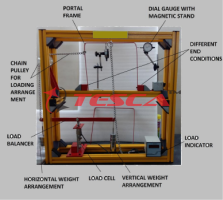

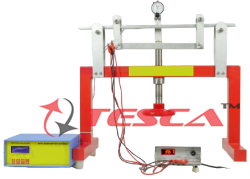

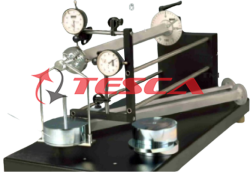
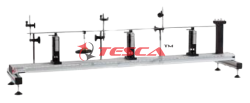

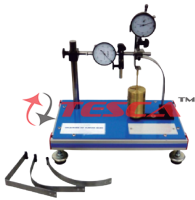

 91-9829132777
91-9829132777